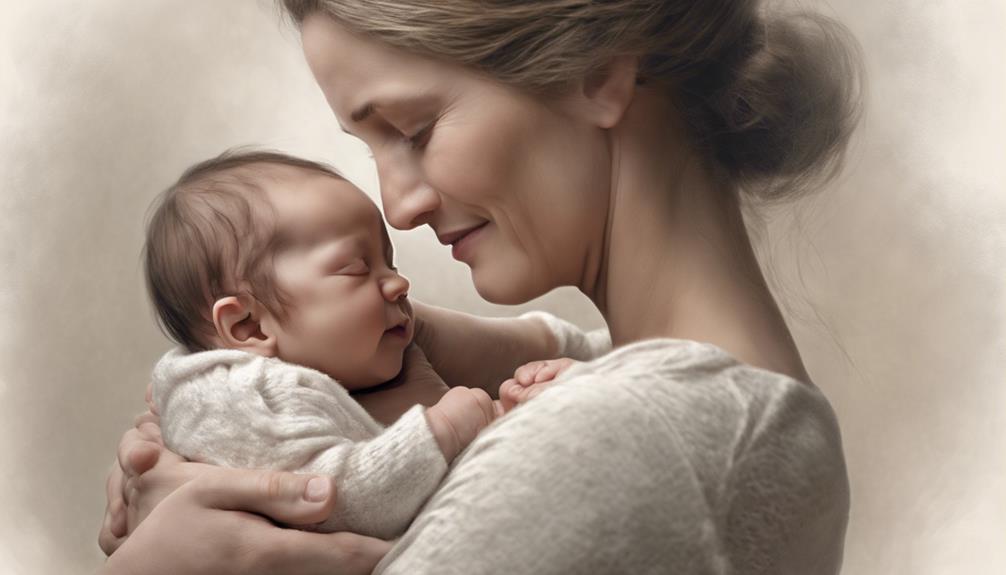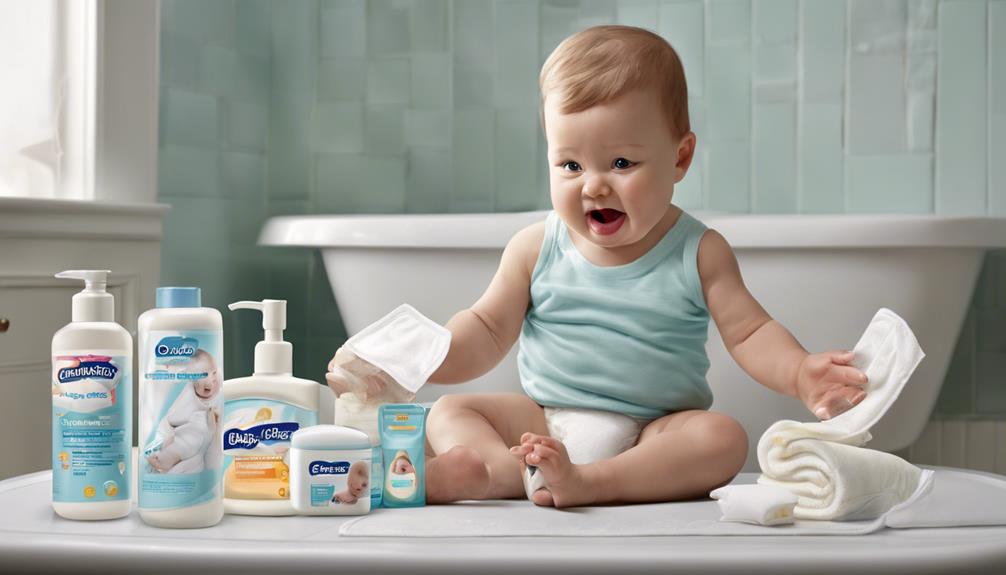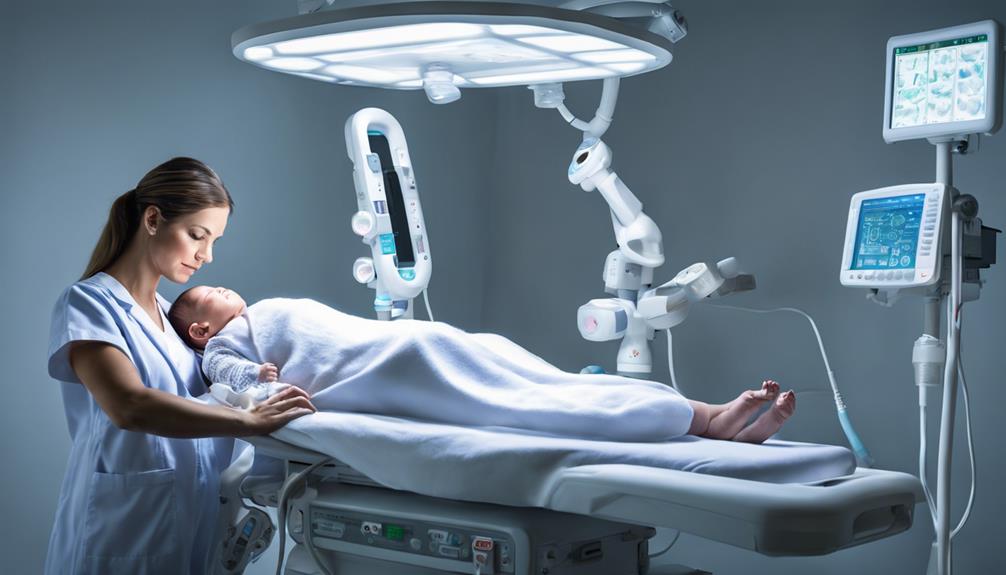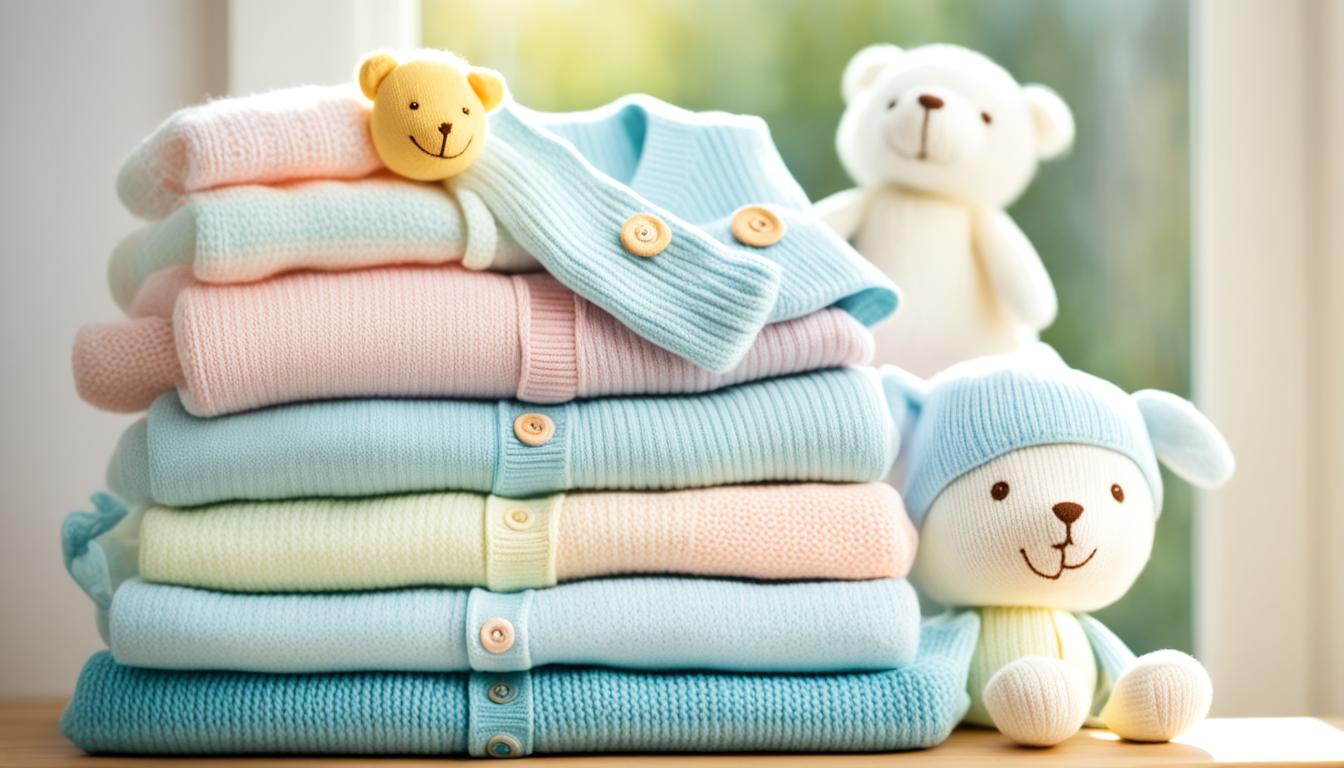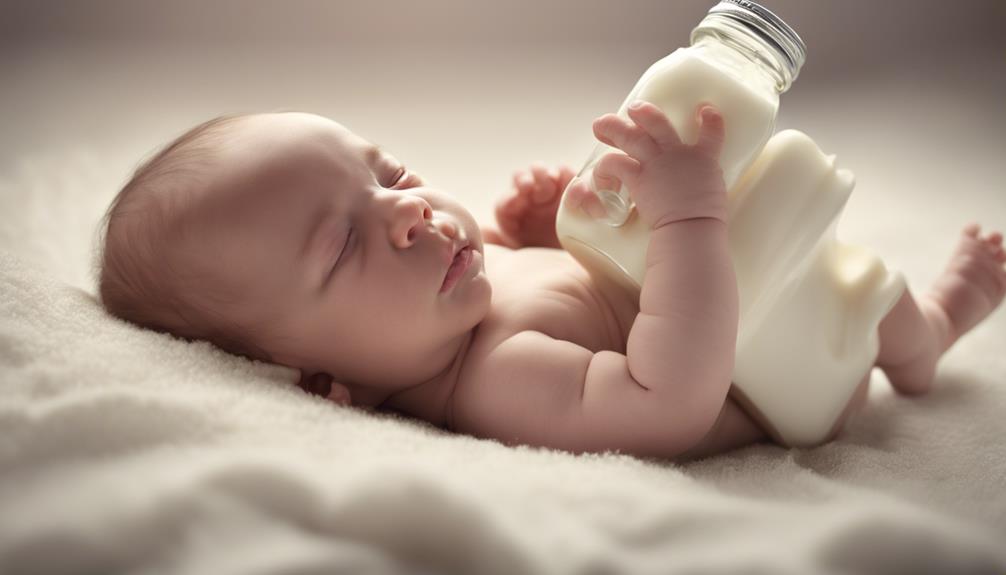If your little one's hiccup symphony plays on after feeding time, don't worry! There are natural ways to help silence those tiny hiccups that can disrupt your newborn's peace.
From simple burping techniques to soothing positions, you can find relief for your baby. But what about those persistent hiccups that just won't quit?
Stay tuned to discover the best methods to ease those pesky hiccups after breastfeeding and guarantee your baby's comfort.
Key Takeaways
- Offer a pacifier after breastfeeding to soothe and relax the diaphragm.
- Keep baby upright post-feeding to aid digestion and prevent hiccups.
- Gently burp the baby to release trapped air and reduce hiccups.
- Avoid overfeeding by opting for smaller, frequent feedings to prevent stomach pressure.
Causes of Newborn Hiccups
Newborn hiccups are commonly triggered by diaphragm spasms that result from various factors, such as swallowing air, overfeeding, or stomach pressure. Your baby's diaphragm, a vital muscle for breathing, can spasm involuntarily, causing those adorable yet sometimes concerning hiccups.
When your little one swallows air while feeding, it can irritate the diaphragm, leading to hiccups. Similarly, overfeeding can overwhelm their tiny stomach, putting pressure on the diaphragm and causing those cute hiccup sounds. Remember to burp your baby during and after feeding sessions to release any trapped air and reduce the chances of hiccups.
Understanding these causes can help you navigate and reassure yourself when your newborn experiences hiccups. It's all part of their development and usually nothing to worry about. Just enjoy those precious moments with your little one, knowing that these hiccups will likely stop on their own.
Natural Remedies for Hiccups
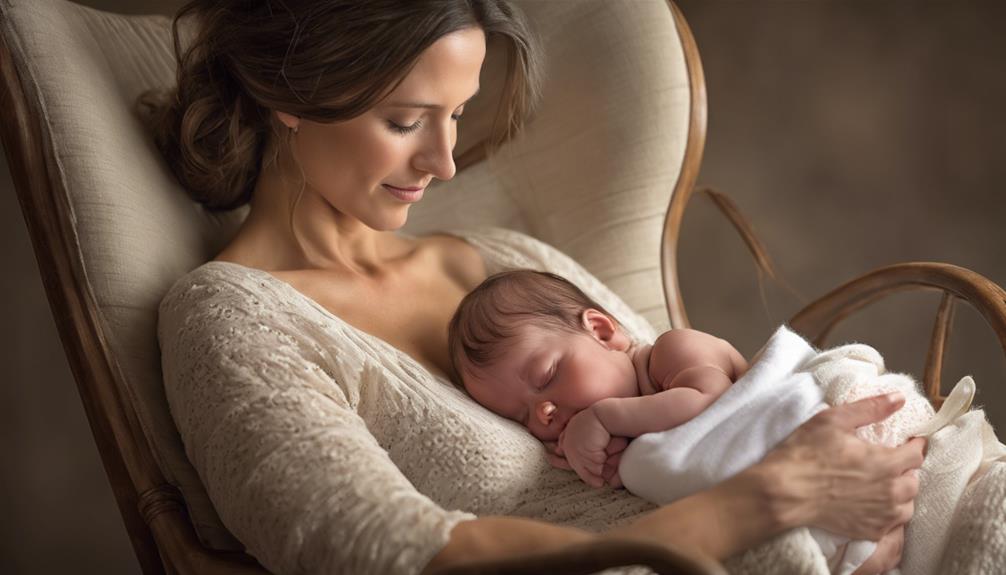
If your little one is experiencing hiccups after breastfeeding, there are natural remedies you can try to help ease their discomfort and promote relaxation. Offering a pacifier after breastfeeding can help relax the diaphragm and stop hiccups. Gently burping the baby after breastfeeding can release trapped air and alleviate hiccups. Keeping the baby upright for about 30 minutes after breastfeeding can aid in digestion and prevent hiccups. Creating a calm and soothing environment during and after breastfeeding can help reduce the occurrence of hiccups in newborns.
| Remedies | Description | Benefits |
|---|---|---|
| Pacifier | Offer a pacifier after breastfeeding to relax the diaphragm and help stop hiccups. | Promotes relaxation and comfort. |
| Burping | Gently burp the baby after feeding to release trapped air and alleviate hiccups. | Aids in releasing gas and discomfort. |
| Upright Time | Keep the baby upright for 30 minutes after breastfeeding to aid digestion and prevent hiccups. | Helps prevent hiccups by aiding digestion. |
Positioning Techniques to Stop Hiccups
To effectively prevent hiccups in your little one, consider implementing proper positioning techniques during and after feeding. Ensuring your baby remains upright for 20-30 minutes post breastfeeding can aid digestion and reduce the likelihood of newborn hiccups. Try placing your baby in a slightly inclined position during feeding, as this can also help minimize hiccups. Utilizing a breastfeeding pillow or cushion to support your baby at the right angle is beneficial in preventing excess air intake, which can lead to hiccups.
Confirm a proper latch during breastfeeding to reduce air ingestion and further decrease the chances of hiccups in your newborn. Remember to avoid putting pressure on your baby's abdomen while nursing to prevent excess air intake. These positioning techniques can make a significant difference in keeping hiccups at bay and promoting a more comfortable feeding experience for both you and your baby.
Preventing Hiccups in Newborns

After breastfeeding, implementing simple strategies can help effectively prevent hiccups in your newborn. Remember to burp your baby after each feeding to release trapped air and reduce the chances of hiccups.
Keeping your little one upright for 20-30 minutes post-feeding can aid digestion and further decrease the likelihood of hiccups occurring. Offering a pacifier after breastfeeding can help relax the diaphragm and naturally stop hiccups.
Be mindful not to overfeed your baby; opt for smaller, more frequent feeding sessions to prevent hiccups from happening. Creating a calm and quiet environment during breastfeeding can help reduce stress for both you and your newborn, lowering the chances of hiccups.
When to Seek Medical Advice
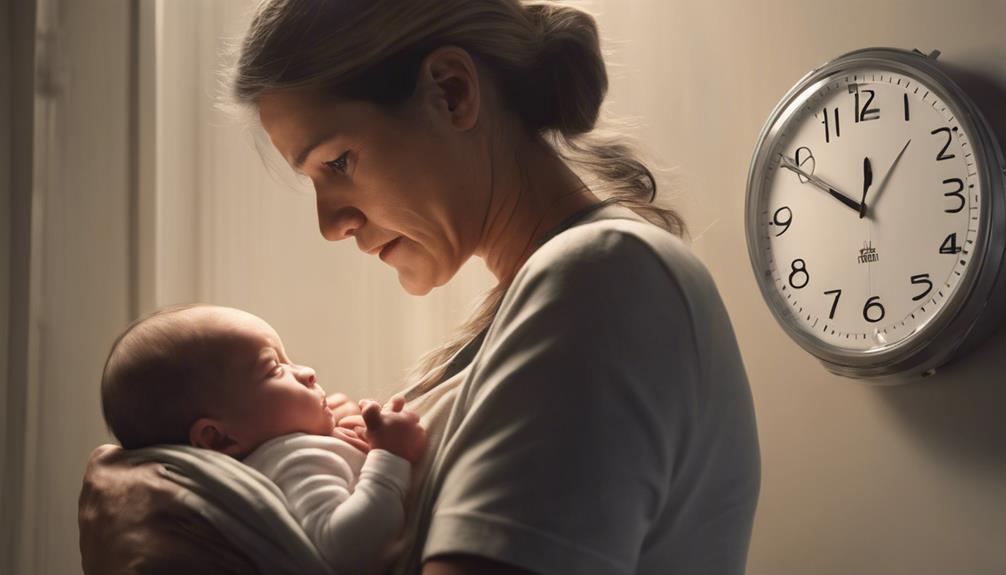
Seek medical advice promptly if your newborn's hiccups persist for more than 10-15 minutes following breastfeeding, especially if accompanied by signs of discomfort or distress. Monitoring your baby for any unusual patterns or changes in the frequency or intensity of the hiccups after feeding is crucial. If the persistent hiccups start to interfere with your baby's feeding or sleep, seeking a doctor's evaluation may be necessary. Additionally, if the hiccups are accompanied by symptoms such as excessive spitting up or difficulty breathing, consulting a healthcare provider is highly recommended to rule out any underlying issues. Your baby's well-being is paramount, and seeking timely medical advice can help guarantee proper management of any potential concerns.
| Signs to Watch For | When to Seek Medical Advice |
|---|---|
| Hiccups lasting over 10-15 minutes post-feeding | Promptly, if accompanied by discomfort |
| Changes in frequency or intensity of hiccups | If interfering with feeding or sleep |
| Hiccups accompanied by difficulty breathing or excessive spitting up | Immediate medical evaluation |
Frequently Asked Questions
How Do I Stop My Baby From Hiccuping After Breastfeeding?
To stop your baby from hiccuping after breastfeeding, try burping, offering a pacifier, keeping them upright, avoiding overfeeding, and creating a calm feeding environment. These practices can help release trapped air and relax your baby's diaphragm.
Do Hiccups Mean Baby Is Full?
Hiccups in babies do not necessarily mean they are full after breastfeeding. They can happen due to various factors. It's normal and harmless. Trust your instincts and comfort your little one gently.
Is It OK to Lay Baby Down With Hiccups?
Placing your baby down with hiccups is perfectly safe. They can peacefully rest and aid digestion. Guarantee their comfort and monitor their breathing. Trust that hiccups won't harm them. Embrace these moments of calm.
Is It OK for My Newborn to Hiccup After Feeding?
It's perfectly normal for your newborn to hiccup after feeding. These hiccups help release trapped air and aid in digestion. Unless persistent or with other symptoms, they're nothing to worry about. Just let them pass naturally.
Conclusion
Well, looks like you've got a little hiccup master on your hands! Remember, hiccups in newborns are common and usually harmless.
Just try out some of these natural remedies and positioning techniques to help your little one find some relief.
And if those hiccups just won't quit, don't hesitate to reach out to your healthcare provider for some extra support.
Hang in there, hiccup hero!
